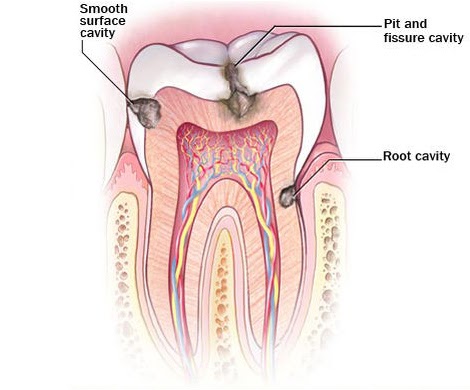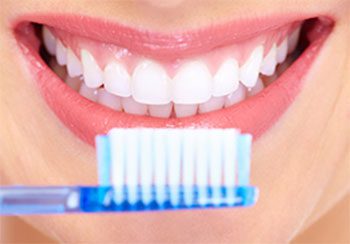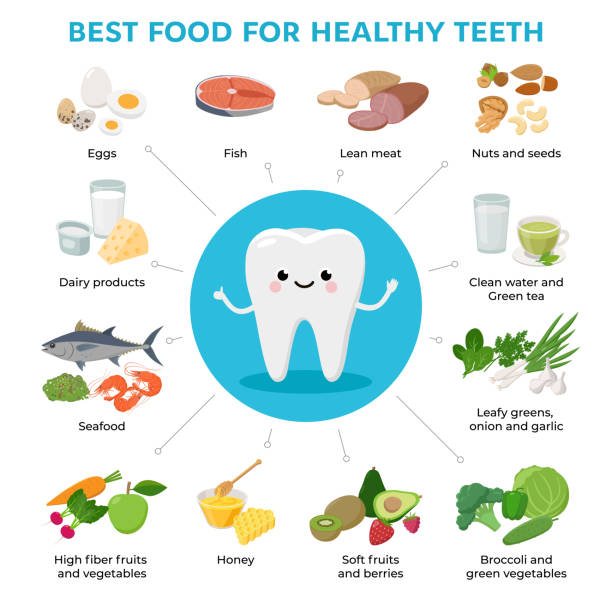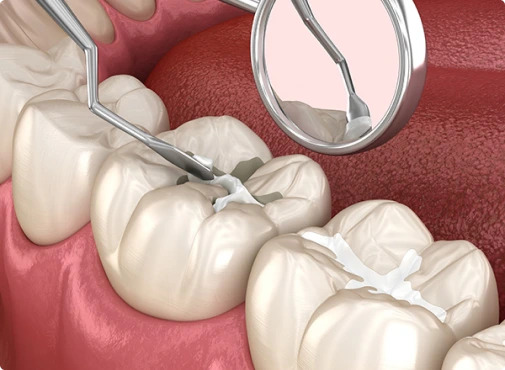Dental cavities, also known as caries or tooth decay, are permanently damaged areas in the hard surface of the teeth that develop into tiny openings or holes. Left untreated, dental cavities can progress into large lesions that expose the tooth pulp and roots to bacteria and debris, causing significant discomfort, damage to the tooth, and infection. Bacteria from decayed teeth can also travel throughout the body, leading to systemic inflammation and increasing the risk of diabetes, heart disease, and other chronic health conditions. So developing good oral health practices will prevent cavities and contribute to overall wellness.

Despite these risks, dental cavities remain a common problem, especially in children and young adults. According to the CDC, over half of all school-aged children and adolescents have had a cavity in at least one tooth.
To maintain optimal oral health and whole-body wellness, cavity prevention and treatment should be emphasized at all stages of life. Fortunately, tooth decay can be arrested (and even reversed) in its early stages with excellent oral hygiene and routine dental care.
Read on to learn more about dental cavities and how you can stop them from developing:
Table of Contents
What Causes Dental Cavities and Tooth Decay?
Cavities are caused by a combination of factors, including bacteria in the mouth, sugary and starchy foods, poor oral hygiene, inadequate access to dental care, and a lack of fluoride. Other factors that can increase the risk of dental cavities include using medications that cause dry mouth (xerostomia), deep tooth grooves and pits, and certain medical conditions that reduce saliva production.
Cavities form when plaque, a sticky film of bacteria, combines with sugars and starches from food to produce acids that attack the tooth enamel, causing it to lose essential minerals like calcium and phosphate. Over time, this process weakens the dental enamel (the outer protective layer of the teeth), creating a conducive environment for cavities to form.
As the enamel continues to break down, small holes or cavities often develop on the surface of the teeth. These cavities can deepen and widen if left untreated, leading to further damage to the tooth structure and gum inflammation and allowing bacteria to enter the bloodstream.
 100vw, 2560px” data-lazy-src=”https://drdalmao.com/wp-content/uploads/2024/02/1582139274-shutterstock75515101-scaled.jpg” /></span></div>
<div class=)
Brushing, flossing, and ensuring proper saliva flow slow the process of tooth decay by removing plaque and neutralizing harmful acids in the mouth. Brushing and flossing (along with professional teeth cleaning) also stop plaque from hardening into tartar. Tartar is a calcified deposit containing plaque and bacteria that cannot be removed with brushing alone.
What Are the Signs of Dental Cavities?
In the early stages, dental cavities may not cause any symptoms. As cavities progress, signs may include tooth sensitivity to hot, cold, or sweet foods, toothache or pain when biting down, visible pits or holes in the teeth, and dark spots or staining on the tooth surface. However, not all cavities are visible to the naked eye: Cavities can occur on any tooth surface, including between teeth, near the gum line, and around existing dental restorations, where they may be difficult to see. For this reason, regular dental check-ups are essential for detecting cavities in their early stages.
For those with genetic deformities or jaw abnormalities resulting from trauma, surgery may be required to properly align the teeth. As an experienced oral surgeon, Dr. Oscar Dalmao can advise you on orthodontic care and the best way to bring your teeth into their proper position. You can view a full list of orthodontic and other services that our Mississauga dental clinic provides here.
Why Should Dental Cavities Be Prevented?
Because dental fillings are painless and inexpensive, many people are unaware of the importance of preventing cavities. Even small cavities cause damage to the enamel and dentin, weakening the structure of the tooth. Without long-term monitoring from a dentist, dental fillings can degrade, leaving the tooth vulnerable to future complications.
By taking measures to prevent cavities, you can preserve your natural teeth and avoid the need for extractions or further restorative treatments (like larger fillings or crowns). A cavity-free mouth also enhances comfort by reducing tooth sensitivity, improving the ability to chew and speak, and eliminating the need for invasive dental procedures, such as root canals or dental implants.
7 Ways to Prevent Cavities
1. Practice Good Oral Hygiene
Brush your teeth thoroughly with fluoride toothpaste at least twice a day, preferably after meals. Use a soft-bristled toothbrush and brush in gentle, circular motions to remove plaque and food particles from all tooth surfaces. Avoid scrubbing the teeth forcefully, as this may erode the dental enamel and contribute to gum irritation and inflammation.
Floss between your teeth once daily to clean areas your toothbrush may not reach, such as between teeth and along the gum line. Start by selecting your preferred type of floss (waxed, unwaxed, traditional thread floss, or a floss pick), then break off about 18 to 24 inches of floss (if using thread floss) and wrap the ends around your middle fingers, leaving a few inches of floss to work with. Hold the floss between your thumbs and index fingers and gently slide a clean section back and forth between your teeth. Be careful not to force the floss, as this can injure the gums. After flossing, rinse your mouth with water to remove loosened debris and particles.
You can also follow up with mouthwash for added freshness and further plaque control.

2. Limit Sugary and Acidic Foods
Reduce your consumption of sugary and acidic foods and beverages, such as candies, sodas, and fruit juices. Sugary foods contribute to tooth decay by feeding bacteria in the mouth that produce acids harmful to dental enamel, whereas soda and fruit juices deposit acids directly on the teeth. If you consume sugary or acidic foods or beverages, rinse your mouth with water immediately afterward to neutralize the acids and discourage plaque formation. Avoid brushing your teeth for half an hour after drinking acidic beverages to reduce enamel erosion.
3. Choose Tooth-Friendly Snacks

Choosing tooth-friendly snacks is another useful strategy to prevent cavities and gum disease. Tooth-friendly snacks consist of foods high in natural fibre, which helps remove plaque and bacteria from the teeth, and foods containing tooth-strengthening vitamins and minerals.
Tooth-friendly food and drink options that are low in sugar and less likely to contribute to dental problems include:
- Fresh Fruits and Vegetables: Crisp fruits and raw vegetables like apples, carrots, celery, and bell peppers are excellent choices for snacks. They are high in water and fibre, which can help clean teeth and stimulate saliva production to neutralize acids in the mouth.
- Nuts and Seeds: Nuts and seeds, such as almonds, walnuts, and sunflower seeds, are nutritious snacks rich in protein, fibre, healthy fats, and vitamins. They both help clean the teeth and support better gum health.
- Dairy Products: Dairy products like cheese and yogurt are rich in calcium and protein, which are beneficial for tooth strength and enamel health. Cheese also stimulates saliva production, which can help protect teeth from acids and bacteria.
- Whole Grain Crackers: Whole grain crackers or rice cakes are a good alternative to sugary or starchy snacks. Look for options with minimal added sugars and pair them with cheese or hummus for a more satisfying and tooth-friendly snack.
- Hard-Boiled Eggs: Hard-boiled eggs are a convenient and protein-rich snack that can help keep you feeling full and satisfied. They are low in sugar and provide essential nutrients for gum and bone health.
4. Stay Hydrated
Drink plenty of water throughout the day, especially after meals and snacks. In addition to rinsing away food particles and neutralizing acids in the mouth, water enhances saliva flow. Saliva contains compounds that help remineralize the teeth, so staying hydrated is an important step in preventing cavities. Sucking on sugar-free candies or chewing sugar-free gum can also increase saliva production, especially if you experience dry mouth. Look for gum containing xylitol, a natural sweetener that can help prevent cavities.
5. See Your Dentist for Regular Dental Check-Ups
Schedule dental check-ups and cleanings every six months, or as often as recommended by your dentist. Regular dental visits allow your dentist to detect early signs of cavities and provide preventive treatments to maintain your oral health. Using tools such as dental X-rays, dentists can identify the subtle signs of tooth decay before cavities have a chance to form, eliminating the need for more costly and invasive treatments down the line.
Professional teeth cleaning is also critical to cavity prevention because it removes plaque and tartar from below the gum line – areas toothbrushes can’t reach.
6. Consider Dental Sealants
For those with unusual dental features, such as large gaps or fissures in the teeth, dental sealants provide an added layer of protection against tooth decay. Dental sealants are a protective coating applied to the chewing surfaces of molars to prevent food particles and plaque from infiltrating hard-to-reach spaces.

7. Try Fluoride Treatment
Use fluoride toothpaste and mouthwash to strengthen tooth enamel and prevent cavities. Fluoride helps remineralize enamel and make teeth more resistant to acid attacks from plaque bacteria.
If your teeth are prone to decay, you can ask your dentist to apply specialized fluoride treatments during your dental exam. Fluoride gels, varnishes, and rinses deliver a concentrated dose of fluoride to your teeth, safely and effectively creating a barrier against demineralization and decay.
Conclusion
By understanding the causes, symptoms, and risk factors associated with cavities, you can take proactive steps to protect your teeth and maintain optimal oral health. Making smart food choices, practicing excellent oral hygiene, and seeing your dentist regularly for check-ups all play a crucial role in keeping your mouth healthy and cavity-free.
At Dr. Dalmao and Associates, we incorporate oral care education into routine dental exams, ensuring our patients have the knowledge and tools needed to maintain a beautiful, functional smile. We also offer multiple preventative and restorative treatments to address tooth decay, including advanced options such as crowns and dental implants.
Whether you want to prevent cavities or repair your smile, we can help: Contact our Mississauga dental clinic today to schedule your next dental exam.


